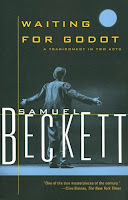Third Sunday of Advent: Waiting for Messiah
 In Samuel Beckett’s legendary play, Waiting for Godot, the
two main characters Vladimir and Estragon wait endlessly for the arrival of the
mysterious Godot. They wait and they wait, but Godot never comes. This play
belongs to a class of literature knows as “theater of the absurd” because it
deals with the seeming meaninglessness of life, leading characters to act in
irrational and inexplicable ways.
In Samuel Beckett’s legendary play, Waiting for Godot, the
two main characters Vladimir and Estragon wait endlessly for the arrival of the
mysterious Godot. They wait and they wait, but Godot never comes. This play
belongs to a class of literature knows as “theater of the absurd” because it
deals with the seeming meaninglessness of life, leading characters to act in
irrational and inexplicable ways.
In our Luke 3 passage for this week, people are waiting on
the Messiah. Some listen to John the Baptist and begin to wonder if John might
be the one who is coming. John apparently hears what they’re thinking and tells
them he isn’t the one they should wait for. Another is coming who is greater
and more powerful than John. They should wait for him.
John said to the crowds that came out to be baptized by him, “You brood of vipers! Who warned you to flee from the wrath to come? Bear fruits worthy of repentance. Do not begin to say to yourselves, ‘We have Abraham as our ancestor’; for I tell you, God is able from these stones to raise up children to Abraham. Even now the ax is lying at the root of the trees; every tree therefore that does not bear good fruit is cut down and thrown into the fire.”And the crowds asked him, “What then should we do?” In reply he said to them, “Whoever has two coats must share with anyone who has none; and whoever has food must do likewise.” Even tax collectors came to be baptized, and they asked him, “Teacher, what should we do?” He said to them, “Collect no more than the amount prescribed for you.” Soldiers also asked him, “And we, what should we do?” He said to them, “Do not extort money from anyone by threats or false accusation, and be satisfied with your wages.”As the people were filled with expectation, and all were questioning in their hearts concerning John, whether he might be the Messiah, John answered all of them by saying, “I baptize you with water; but one who is more powerful than I is coming; I am not worthy to untie the thong of his sandals. He will baptize you with the Holy Spirit and fire. His winnowing fork is in his hand, to clear his threshing floor and to gather the wheat into his granary; but the chaff he will burn with unquenchable fire.” So, with many other exhortations, he proclaimed the good news to the people (Luke 3:7-18).
After this, excitement grows when Jesus arrives on the scene. He declares
the good news about God’s kingdom. He heals the sick and helps the poor. He
teaches with power and offers forgiveness to sinners.
But despite all the good stuff, there’s something strange
about Jesus—at least to his peers. He’s not the kind of Messiah most folks
expect. He doesn’t preach against Rome. He doesn’t gather an army. He doesn’t
do what messiahs are theoretically supposed to do.
As we fast-forward to Luke 7, John the Baptist isn’t so sure
about Jesus either. From his perch in prison, he sends messengers to ask Jesus,
“Are you the one who is coming, or should we wait for another?” Folks such as John are waiting for Messiah, but they aren’t sure if he's ever going to
come.
Here’s the problem with those waiting for Messiah in first-century Palestine. They were waiting in vain for the wrong kind
of messiah. Proudly tracing their lineage back to Abraham, many Jews assumed God would redeem them in the way they expected for the purpose they had
decided. All this clouded their vision. They were waiting for Messiah. But here's the irony: They didn’t see his arrival. Their waiting was for naught. They couldn’t see God’s
Son right before their eyes. It was an ancient form of the theater of the absurd.
 Today, we wait for Jesus. We wait for him to come and do
something with our messed-up world. We’re waiting for redemption, but will we
see it when it comes? Will we be like John the Baptist and his followers who
were unable to see the good right in front of their eyes? Will we end up
waiting endlessly in futility like the characters in Beckett’s famous play? (Like
the absurdist French school of thought from the 20th-century who—perhaps
rightly—saw hopelessness in the modern endeavor?) Will we endlessly wait? Or will
we instead know what the good news of Jesus’ arrival looks like?
Today, we wait for Jesus. We wait for him to come and do
something with our messed-up world. We’re waiting for redemption, but will we
see it when it comes? Will we be like John the Baptist and his followers who
were unable to see the good right in front of their eyes? Will we end up
waiting endlessly in futility like the characters in Beckett’s famous play? (Like
the absurdist French school of thought from the 20th-century who—perhaps
rightly—saw hopelessness in the modern endeavor?) Will we endlessly wait? Or will
we instead know what the good news of Jesus’ arrival looks like?


Comments